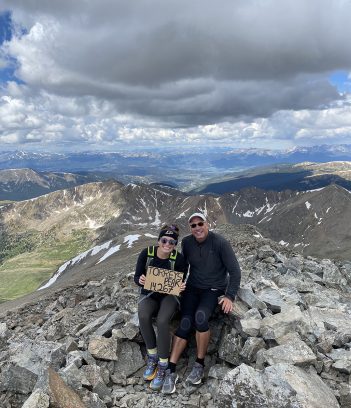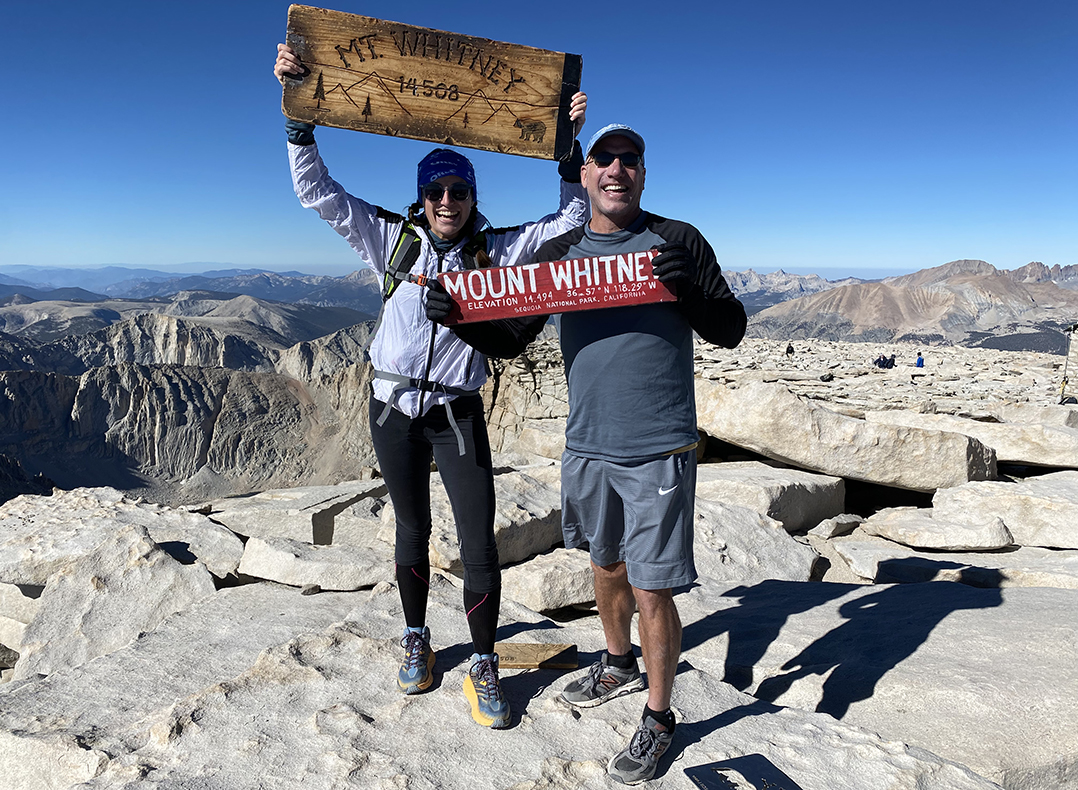During the height of the COVID-19 pandemic, Greg and Chandler Dykstra found the perfect father-daughter activity when they took their love for hiking to the next level.
It all started after Chandler, a 2016 Carmel High School graduate who had recently overcome debilitating health issues, was finally ready to compete for Purdue University’s track team.
“Then when COVID-19 came around, it canceled the 2020 season,” Greg said. “She was in really good shape but had no (outlet) to participate in anything. We had previously gone to the Smoky Mountains, but when COVID came out in the summer of 2020 we started doing these 14,000 feet peaks in Colorado. During COVID you needed to participate in something you had personal control over because the group activities were canceled.”
They reached the ultimate goal of reaching the top of California’s Mt. Whitney, the highest peak in the continental U.S. at 14,495 feet, in August.
“Setting a goal and being able to achieve it is a huge thing for both of us,” Chandler said. “It’s been fun to do that together and to climb together. I’m aware it’s a unique experience my dad and I have together. I know not everyone has that relationship with their dad or is able to do that with their dad, so it’s something I appreciate. Then with my health issues there was a point in my life when I was told I’d never be able to run again and to start rethinking my goals and dreams. It’s been absolutely amazing to be able to conquer all of that. Hiking the highest peak is just a great achievement after having been through everything I’ve been through.”
Chandler got a virus in high school and developed dysautonomia, a condition in which the autonomic nervous system is damaged. The condition, also called postural orthostatic tachycardia syndrome, affects blood flow. Symptoms include fainting, lightheadedness and uncomfortable rapid heartbeat.
“She had been an awesome athlete, but when she got this even climbing one flight of stairs would send her heart rate into overdrive,” Greg said.
Chandler said her body lost the ability to autonomically control heart rate and blood pressure.
“I went from running at national high school indoor championships in March of my senior year of high school to in a month not really being able to get out of bed and can’t even walk up the stairs,” Chandler said. “I went from the highest point of my life getting ready to run at a D-I school with great academics to bedridden.”
While she was still trying to run at Purdue when she could, Chandler visited several specialists. It was finally recommended that she have two heart surgeries for cardiac ablations her sophomore year at Purdue to help control her heartbeat.
“The sad reality is I never did get to compete for Purdue,” she said.
Chandler would have qualified for another year of eligibility but decided against it because of the uncertainty with COVID-19. She started her first year at the College of Osteopathic Medicine at Marian University this fall. She graduated from Purdue in 2020 with a degree in brain and behavioral sciences and then took a year off.
“We kind of got into the hiking scene my junior year at Purdue while I was still getting back into shape,” Chandler said.
After hiking the trails in the Smoky Mountains in Tennessee and North Carolina, Chandler said she and her father decided to take it up a notch.

“I wanted to push my boundaries and we went to Colorado to start doing the 14,000 feet peaks,” she said.
They did five Colorado hikes in the summer of 2020 and four more in the state before climbing Mt. Whitney. The Colorado hikes usually take four to eight hours.
“I like the individualism of it,” Greg said “You select the mountain you think you want to climb. I find it interesting, being on your own, setting a goal and executing it.”
Greg, 53, ran competitively at CHS and the University of Tennessee. Greg, who was injured often in college, has competed in marathons and triathlons.
Getting to the start of the trail can often be difficult.
“I tell people climbing the mountain is the easy part, the hardest part is everything else,” said Greg, who said he and his daughter consider themselves one-day endurance hikers.
Chandler said it’s best to summit a mountain by noon so there is time to get back down because Colorado often has afternoon thunderstorms around 2 or 3 p.m.
“You don’t want to get caught at the top of the peak when it’s windy, storming or lightning,” Chandler said.
Chandler said it takes months of planning and research to climb Mt. Whitney and that a permit is required by applying online. After missing out in March and April, they got lucky and got through in the final round for 2021.
“As soon as it hit time to register on May 1, I instantly clicked on the first date, Aug. 5, and we got it for that date,” Chandler said. “We were super lucky. I learned it takes some people years just to get a permit.”
They started out for the 22 1/2-mile hike at 2 a.m. and reached the top at 8:50 a.m.
“We started out conservatively because we knew it was going to be a long day,” Chandler said. “We stayed there for about 45 minutes and got back down around 3 p.m. Mt. Whitney is like the Olympics of day hiking. It’s seen as the most challenging day hike you can do in the United States.”
This is a chronological listing. Hiking/Climbing Season is generally considered June to September.
2020
Mount Elbert 14,439ft (highest point in Colorado)
Mount Massive 14,429ft (Colorado)
Grays Peak 14,278ft (Colorado)
Mount Sherman 14,035ft (Colorado)
Mount Bierstadt 14,065ft (Colorado)
2021
Mount Evans 14.265ft (Colorado)
Torreys Peak 14,275ft (Colorado)
Quandary Peak 14,265ft (Colorado)
Huron Peak 14,009ft (Colorado)
Mount Whitney 14,495ft (California, highest point in the continental U.S,)
DON’T FORGET
Father-daughter day hiking duo Greg and Chandler Dykstra have discovered some key items to have on hand during their journeys.
- Sun protection: Sunglasses, sunscreen, and sunhat are necessary because of intense sun exposure. Yes, hikers can get sunburned, even on a totally cloudy day at higher elevations.
- HotHands hand warmers: Very lightweight and hikers can slip them right into their gloves when temperatures drop.
- Landmark list: Keep a list of notable landmarks and associated mileage handy; it’s especially useful when hiking long hours in the dark.
- Quick and easy carbs are a must for high altitudes: Snickers, fruit snacks, muffins, etc. Leave the trail mix behind.
- Electrolytes: Replenish with powders or tablets like Liquid IV or Nuun.



